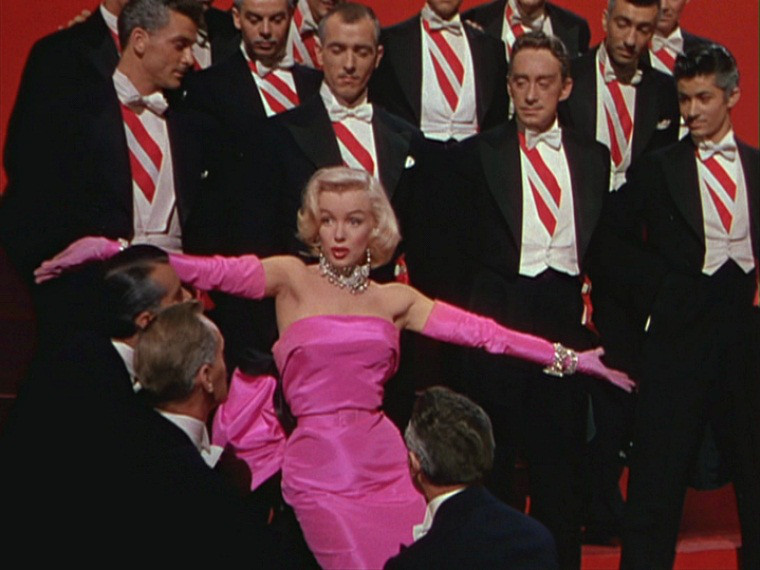was so bad-assed you’d think people would show respect. Instead, one of American-dance’s most original creators was stolen from, even in his lifetime–and he knew it.
Nineteen million people watched, on Sunday night, when, at the 96th Oscar Award ceremony, actor Ryan Gosling, looking hot in hot pink (“Barbie pink,” as it has come to be known), sashayed onto the stage of the Dolby Theater, mike in hand, and charmed the room in a rousing round of Oscar-nominated song, “I’m Just Ken.”
Then he danced. Kind of. He moved with grace and confidence, waving his pink-gloved hand as he fit in among a gang of guys who slithered in sleek hip-hop unison stepping. The energy was high and while it was a bit of a mess to view via camera, the reaction in the Dolby audience left no doubt that, in person, the effect was electric.
Gosling’s “I’m Just Ken” was uniformly called the runaway hit of the Oscars broadcast (The New York Times next-day headline: “How ‘I’m Just Ken’ Won the Oscars Without Winning an Actual Oscar”). Perspicacious viewers noted, in real time, that the number rested on several judiciously borrowed motifs and memes from Jack Cole‘s “Diamonds Are A Girl’s Best Friend,” itself the jewel in the crown of Gentlemen Prefer Blondes (1953). It also borrowed from Busby Berkeley in its use of an overhead shot with dancers scurrying around holding face masks of Barbie — quoting from “I Only Have Eyes for You” Berkeley’s number in Dames (1934) featuring the many heads of Ruby Keeler in Berkeleyesque patterns.
But back to “Diamonds.” Because that’s the problem. The name Busby Berkeley falls trippingly off tongues. Jack Cole’s does not.
The first giveaway was the staging of “I’m Just Ken” on a cropped red staircase, as did Cole for “Diamonds.” Cole often used structures like staircases in his film choreography (others: ladders, ramps, boxes, even sliding boards) in order to exploit every inch of the film frame’s real estate.
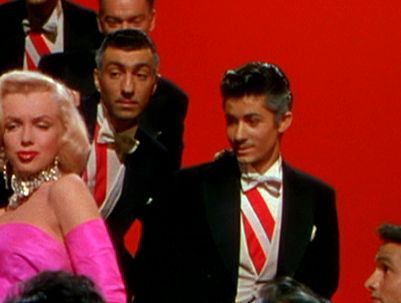
“I’m Just Ken”‘s male dancers, like Cole’s in “Gentlemen,” wear red sashes as “Ambassadors.” The fact that the tuxedo-clad men surrounding Marilyn Monroe (there, I’ve said her name) are playing ambassadors was relayed to me by George Chakiris, who was one of them.
“Ken” also borrowed from Cole’s anthropomorphic human candelabrae which in turn Cole may have borrowed from Jean Cocteau’s hand-held ones in Beauty and the Beast (1946). This was not in my line of vision (the number was frenetic) but Mandy Moore who staged it said in interviews that her dancers held candles, calling themselves “Ken-delabras.” The men up hold red punch boards to Gosling, aping how Cole’s dancers held up red Valentine hearts to Monroe.


Cole would never choreograph something so “on the nose” as illustrating the song lyric, “A kiss on the hand may be quite continental …” but Gosling & Moore did. So be it. It was fun when Gosling puckered up and smooched the hand of the Steadicam operator, who turned out to be a man. People in the room knew that; we at home did not. Again, clever.
And on it went. People loved it. Steven Spielberg was seen in the audience broadly smiling with delight. It’s all good. In my capacity as biographer of Jack Cole, in a book still in-process, I’m unsurprised that “Diamonds Are A Girl’s Best Friend” continues to hold such appeal. There have been multiple borrowings from it over the years, famously by Kenny Ortega’s “Material Girl” for Madonna, which also did nothing to credit Jack Cole. I so fervently wish that Cole’s name zinged through popular culture with as much vibrancy as his enduring creativity.
It was crushing, deeply disappointing, to read, first, in her interview in Variety and then, in the New York Times, that choreographer Mandy Moore did not loudly and proudly trumpet the name of Jack Cole.
Here she is quoted in the New York Times:
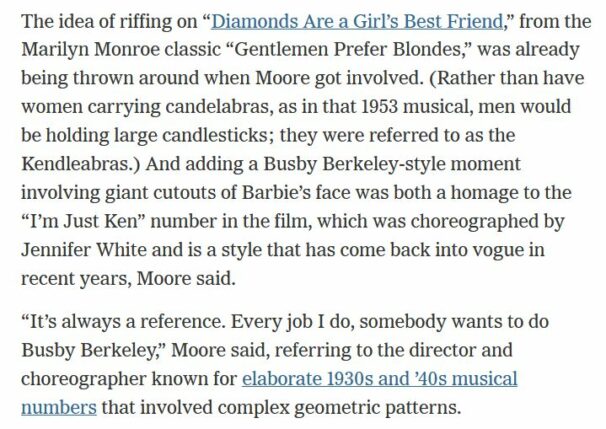
Here she is in Variety:
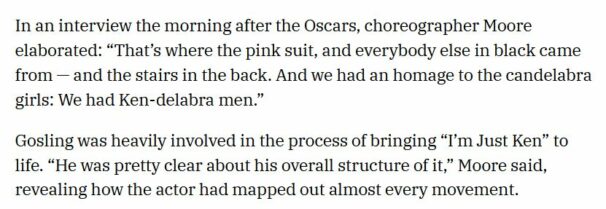
Here Moore speaks to The Hollywood Reporter.
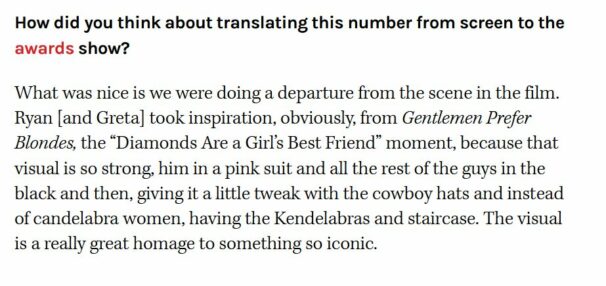
Jack Cole’s “Diamonds” was a “take-two” that he had to come up with under considerable duress — his first, and preferred, version was deemed too sexual and was censored, leaving Cole facing a blank slate. Every element of “Diamonds Are A Girl’s Best Friend,” stemmed from Cole’s febrile imagination: the color scheme, the costumes, the beautifully spare, perfectly rehearsed dance steps for the corps de ballet, the dramaturgy, the brilliant use of space (see Mandy Moore’s version for contrast), and famously, Monroe’s performance assiduously coached and rehearsed by Cole and Gwen Verdon.
Dance makers of Hollywood are seeking recognition for their craft by pressing the Motion Picture Academy to add an Oscar for Best Choreography. That is understandable. But they must first recognize their own. Go ahead, use Cole’s vivid ingenuity in “Diamonds.” Quote from it, bend and shape it, twist it and turn it, have a ball. You can even call it a “Marilyn Monroe dance number,” although that’s not an accurate description. But if you piggy-back on the creation of Jack Cole . . . at least say his name.
Debra Levine is a longtime Los Angeles-based dance critic and the author of an upcoming biography of Jack Cole.
Author wishes to thank Jeffrey Spivak, author of Buzz: the Life and Art of Busby Berkeley, for information.
